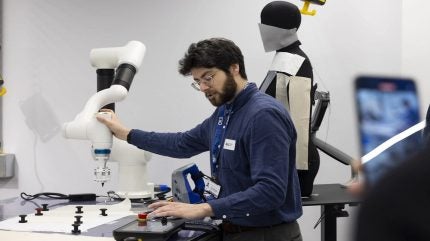
RoLL offers access to both fashion enterprises and academic researchers and is set to revolutionise the way fashion is designed and produced through the use of cobots.
The lab aims to foster sustainable practices within the industry while simultaneously addressing the current skills gap in fashion manufacturing.
This facility, developed with an investment of £3.8m ($4.7m), is equipped with advanced collaborative robotic technology, known as ‘cobots’, which are programmable for the production of sustainable garments in small quantities but with high value.
These robotic arms are versatile, capable of performing tasks such as stitching, drawing, knitting, and even conducting 3D scans of mannequins or human figures to facilitate the prototyping of clothing designs.
The advancements are said to be particularly beneficial for small-scale fashion enterprises seeking to integrate advanced manufacturing techniques for eco-friendly production.
Additionally, the lab will be equipped with advanced design software that enhances pattern cutting and garment assembly processes through digital technology.
Moreover, RoLL is expected to forge new research partnerships and propel studies into sustainable practices that can benefit UK garment producers. The insights gained from this research will contribute to shaping policies on carbon-neutral manufacturing and support Greater Manchester’s ambition to achieve net-zero emissions in the sector by 2038.
The Work in Progress Pavilion, a low-carbon timber-framed structure designed by Bennetts Associates, complements the lab. This space includes an office area, an exhibition hall, and a lecture theatre where RoLL’s work and research can be displayed, along with a dedicated robot cell for live demonstrations.
Manchester Fashion Institute fashion professor and RoLL director Susan Postlethwaite said: “This launch is the culmination of years of planning, collaboration and research, and I’m delighted to showcase the important work of the lab.
“The fashion industry makes a huge contribution to the UK economy, however most of that comes from imported garments. RoLL will play a vital role in attracting the workforce back to the UK, upskilling human workers and offering world-class fashion design products that are locally manufactured.
“I believe that fashion must be taken more seriously when it comes to planning for our manufacturing future and should be included in a new industrial strategy. By using innovative and sustainable technologies here in Manchester, RoLL will help to reshape the agenda for the creative industry.”
Development of the facility is funded by the UK Research and Innovation’s Arts and Humanities Research Council.
RoLL is looking for industry partners for research and is said to be in talks with high-value, sustainable fashion brands interested in collaboration.
Arts and Humanities Research Council executive chair professor Christopher Smith said: “The Robotics Living Lab is a vivid illustration of how cutting-edge technology can be fused with existing strengths and innovative thinking to support the UK’s world-class creative economy.
“Investing together in the infrastructure that underpins excellent research and innovation will help us deliver long term sustainable skills and economic growth and is crucial to ensuring that we deliver on the ambitions outlined in the government’s industrial strategy.”



